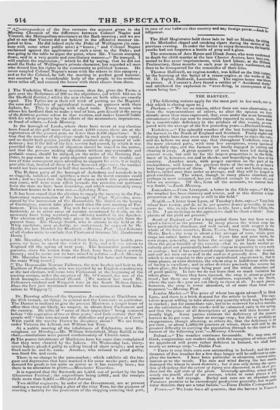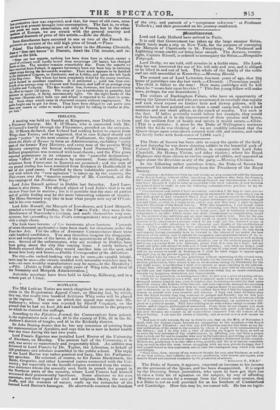THE HARVEST.
(The following notices apply for the most part to last week, not to that which is closing upon us.) Durham,—" We see no reason, either from our own observation, ec from the representations of others, to alter the opinion we have already more than once expressed, that, even under the most favourable circumstance that can now be reasonably expected to arise, there meg be a considerable deficiency in the produce of this county, as sm. pared with the average of the few preceding years.—Durhaniaronids Yorlishire.—" The splendid weather of the last fortnight has saved the harvest in the North of England and Scotland. Frosty nights and drying winds have done even more than the sunshine to ripen the corn; arid we believe we may now say, that throughout Yorkshire, even iS the more elevated parts, with very few exceptions, every species of corn is fully ripe, and the farmers are busily engaged in cutting aee clearing it away. A great quantity of corn has been led during the present week, but still by far the largest proportion is in the field% most of it, however, cut and in shocks, and beautifying the face of the country. Another week, with proper exertion on the part of the husbandman, will house the precious fruits of the earth, or at leasta very large proportion of them. The crops of oats and barley are, we believe, rather over than under an average, and they will be reaped in good condition. The wheat, though in many places abundant, and perhaps in most uninjured, has yet suffered enough to reduce the crop below an average. Of this, from all the accounts, we cannot have any doubt."—Leeds Mercury.
Lancashire.— From Liverpool, a letter in the Globe says---" Of late the weather has been showery and wintry, and in this district a large proportion of the grain crop is still in the field."
Norfolk.—A letter 1 rom Lynn, of Tuesday's date, says—" Very little wheat here to-day, and 2s. to :3.s, per quarter dearer generally, in some cases 4s. 66s. to 67s. fine red wheat, to 68s. best ; arid fine white, 694 to 70s. I urn inclining to the opinion we shall be short a third! Corn. plaints of the yield are general."
South of England.—" For a long period there has not been so an. equal a harvest as the present. In many places the wheat crop has been particularly abundant, and well saved; and with respect to the whole of the home counties, Kent, Essex, Surry, Sussex, Middlesex, Herts, Bucks, the crop is about a fair average of corn, while green crops are rather better than usual. Upon late and poor lands, the corn crops, generally, are below the average yield from such lands. Over the great breadth of the comitry—that is, on lands neither pe. culiarly good nor particularly bad—the crop as to quantity is very nearly an average ; but it has experienced rough treatment from the weather, and will not turn out as well in the sack as it generally does. But that which is most singular in this year's agricultural experience is, that in some places, or even districts, the wheat crop is indifferent while that of barley is excellent ; and in other di.tricts precisely the reverse has taken place, the barley crop being poor and the wheat abundant and of good quality. In oats we do not learn that so much variation has taken place. Where they have ripened, the crop is about as good as usual ; but there are many cold situations, especially in the North, where the oats this year are not likely to ripen at all. In such places, however, the crop is never abundant, or of more than local con- sequence."—Moraing Post. London Market.—" The price of' wheat has again advance in Marl( Lane, and there is a brisk demand for the article in bond. The capi- talists appear willing to take almost any quantity which may behrought to market ; not for immediate sale, but to be reserved for no few months, on the calculation that the stocks will be exhausted early in the spring, and that the prices of all descriptions of grain will then become un- usually high. Some parties estimate the deficiency of the present harvest at 25 per cent, below an average crop ; but this is probably an exaggeration, though allowing, as others do, that the deficiency is 10 per cent., or about 1,500,600 quarters of wheat, there will still be the greatest difficulty in carrying the population through to the tune of the harvest of the following year."—Atorning Chronicle. Ireland.—" The weather continues favourable. We may now, we think, congratulate our readers that, with the exception of wheat, which we apprehend will prove rather deficient in Ireland, we shall have nearly an average crop."—Dublin Post. " There is very little corn now outstanding in Ireland ; and the con- tinuance of fine weather for a few days longer will be sufficient to.com- plete the harvest. I have been particular in obtaining correct infor- mation as to the result. The rain and wind during the last month damaged the wheat in most districts ; but it was only during the opera- tion y thrashing that the extent ey irgury was discovered, in the short pr?. duce and the sift state of the grain. Generally speaking, wheat Wbe_ nearly one fisurth short of an average, whilst in some places it 'Ti amount to a full average. Barley and oats are an abundant crop. Potatoes promise to be exceedingly productive generally, but in partni cuter districts they are a total failure."— Times Dublin Correspondent.. France.—" We learn from all quarters, that the harvest in France a roductive than was expected, arid that, for want of old corn, none befir point new Pot! at present brought into consumption. The fact is, to what- , t we turn observation, not only in France, but in the other eatv:rOete of Europe, we are struck .with the general scarcity and threatened dearness of price of this article.—Echo des Holies. Some disturbances have occurred in one or two of the French de- partments on account of the still high price of bread.— 7'imes. • poiawi. The following is part of a letter in the Morning Chronicle, from first-rate house" in Dantzic, dated the 17th instant, and re. dived on the 25th. sioce our last reports, nothing has been done here in wheat, except a arca of ordinary stuff, hardly better than screenings (30 lasts), has changed eau. The weather remains remarkably fine. From the reports we hare received from Poland, it appears harvesters have not been lazy in carrying wheat crops during the favourable weather. Their work appears to be finished M the districts of Cracow, in Sandomir, and n Lublin, and upon the left hank °idle Bug river. The wheat has been completely dried by the sunny weather, and is housed in excellent condition. It is estimated to yield less than one. forth rth of so average crop n Cracow and Sandomir, and half of an average crop in Lublin and Votlayinii.. The fine weather has, however, not had everywhere the effect to repair old injury. The crop of rye is satisfactory in quantity, but i deficient in quality, t being uncommonly light. On the right banks of the Bug river (Russian side) both rye and wheat is reported to be short in quan- i t,q, Some ships which came n chartered remain without employment. No grain freight can he got far them. They have been obliged to cut ports into the„, Dew vessels in order to make a poor freight by taking in timber at 23s. per load."



























 Previous page
Previous page